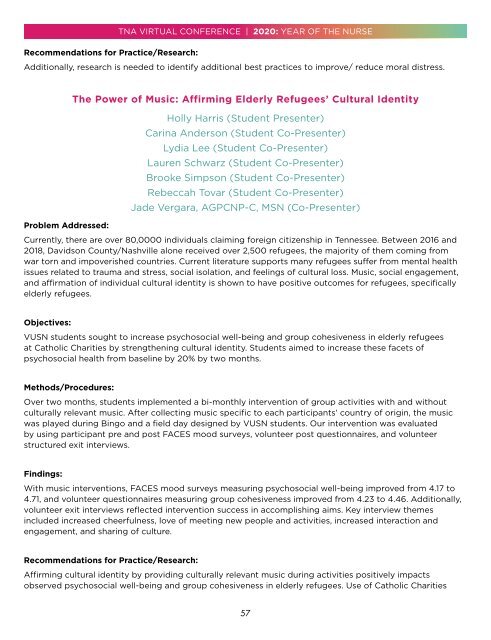Tennessee Yearbook 2020
You also want an ePaper? Increase the reach of your titles
YUMPU automatically turns print PDFs into web optimized ePapers that Google loves.
Recommendations for Practice/Research:<br />
TNA VIRTUAL CONFERENCE | <strong>2020</strong>: YEAR OF THE NURSE<br />
Additionally, research is needed to identify additional best practices to improve/ reduce moral distress.<br />
Problem Addressed:<br />
The Power of Music: Affirming Elderly Refugees’ Cultural Identity<br />
Holly Harris (Student Presenter)<br />
Carina Anderson (Student Co-Presenter)<br />
Lydia Lee (Student Co-Presenter)<br />
Lauren Schwarz (Student Co-Presenter)<br />
Brooke Simpson (Student Co-Presenter)<br />
Rebeccah Tovar (Student Co-Presenter)<br />
Jade Vergara, AGPCNP-C, MSN (Co-Presenter)<br />
Currently, there are over 80,0000 individuals claiming foreign citizenship in <strong>Tennessee</strong>. Between 2016 and<br />
2018, Davidson County/Nashville alone received over 2,500 refugees, the majority of them coming from<br />
war torn and impoverished countries. Current literature supports many refugees suffer from mental health<br />
issues related to trauma and stress, social isolation, and feelings of cultural loss. Music, social engagement,<br />
and affirmation of individual cultural identity is shown to have positive outcomes for refugees, specifically<br />
elderly refugees.<br />
Objectives:<br />
VUSN students sought to increase psychosocial well-being and group cohesiveness in elderly refugees<br />
at Catholic Charities by strengthening cultural identity. Students aimed to increase these facets of<br />
psychosocial health from baseline by 20% by two months.<br />
Methods/Procedures:<br />
Over two months, students implemented a bi-monthly intervention of group activities with and without<br />
culturally relevant music. After collecting music specific to each participants’ country of origin, the music<br />
was played during Bingo and a field day designed by VUSN students. Our intervention was evaluated<br />
by using participant pre and post FACES mood surveys, volunteer post questionnaires, and volunteer<br />
structured exit interviews.<br />
Findings:<br />
With music interventions, FACES mood surveys measuring psychosocial well-being improved from 4.17 to<br />
4.71, and volunteer questionnaires measuring group cohesiveness improved from 4.23 to 4.46. Additionally,<br />
volunteer exit interviews reflected intervention success in accomplishing aims. Key interview themes<br />
included increased cheerfulness, love of meeting new people and activities, increased interaction and<br />
engagement, and sharing of culture.<br />
Recommendations for Practice/Research:<br />
Affirming cultural identity by providing culturally relevant music during activities positively impacts<br />
observed psychosocial well-being and group cohesiveness in elderly refugees. Use of Catholic Charities<br />
57

















